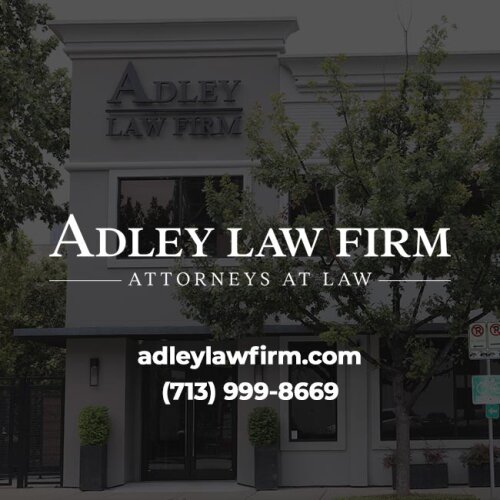Best Ethics and Professional Responsibility Lawyers in Texas
Share your needs with us, get contacted by law firms.
Free. Takes 2 min.
Or refine your search by selecting a city:
List of the best lawyers in Texas, United States
About Ethics and Professional Responsibility Law in Texas, United States
Ethics and Professional Responsibility law in Texas refers to the legal and ethical rules that govern the conduct of lawyers and other professionals within the state. These standards are in place to ensure that professionals act honestly, uphold justice, and maintain public trust. The rules define accepted behaviors, outline duties to clients and third parties, and provide guidelines for resolving conflicts of interest. In Texas, these principles are especially relevant for attorneys, as they must comply with both statewide and national ethical requirements throughout their practice.
Why You May Need a Lawyer
Individuals may need a lawyer specializing in Ethics and Professional Responsibility for several reasons. Common situations include:
- Facing a grievance or complaint about professional conduct filed with the State Bar of Texas
- Accusations of violating confidentiality or mishandling client funds
- Questions about conflicts of interest while representing multiple clients
- Requiring advice on advertising and solicitation rules for legal services
- Assistance with compliance regarding duties to former clients or third parties
- Guidance for law firms on implementing internal ethical procedures and policies
- Responding to investigations from professional regulatory bodies
- Professional risk assessment or ethics audits
- Consequences from disciplinary proceedings that could affect licensure or reputation
Timely and knowledgeable legal assistance can help professionals meet their responsibilities, defend against allegations, or avoid actions that may result in disciplinary measures.
Local Laws Overview
In Texas, the key framework for Ethics and Professional Responsibility among attorneys is the Texas Disciplinary Rules of Professional Conduct (TDRPC). The TDRPC are administered by the Supreme Court of Texas and enforced by the State Bar of Texas. These rules determine acceptable conduct relating to client confidentiality, conflicts of interest, lawyer advertising, communication, handling of fees, duty to report misconduct, and similar areas. Texas attorneys must also comply with federal law and may be subject to rules from the courts where they practice.
Noteworthy aspects include the requirement to report known professional misconduct, specific guidance on handling client trust accounts, and detailed rules regarding attorney-client privilege. Texas also has the Texas Rules of Disciplinary Procedure, which outline the process for investigating and resolving complaints against legal professionals. Other professionals, such as doctors, accountants, and engineers, are accountable to their own governing boards, each with respective ethical codes and enforcement mechanisms.
Frequently Asked Questions
What are the Texas Disciplinary Rules of Professional Conduct?
The Texas Disciplinary Rules of Professional Conduct are a set of regulations that all licensed attorneys in Texas must follow. They detail ethical obligations to clients, courts, and the public, and serve as the basis for disciplinary proceedings.
What happens if a complaint is filed against a lawyer?
When a complaint is filed with the State Bar of Texas, the bar will review the allegations and determine whether disciplinary proceedings are warranted. Potential outcomes include dismissal, admonition, suspension, or disbarment, depending on the severity of the offense.
Can lawyers discuss their clients' cases with others?
Generally, lawyers must protect client confidentiality and cannot disclose case details without the client's consent, except under specific circumstances outlined in the rules, such as preventing certain crimes.
How are conflicts of interest handled in Texas?
Lawyers must avoid representing clients when there is a conflict of interest unless the conflict is properly disclosed and all affected clients give informed consent in writing. The rules detail many examples of potential conflicts.
Are there advertising restrictions for Texas attorneys?
Yes, Texas attorneys must adhere to strict guidelines when advertising their services to ensure truthfulness and prevent misleading statements. All advertising must comply with the Texas Disciplinary Rules of Professional Conduct.
How can complaints against attorneys be resolved?
The State Bar of Texas manages the initiation, investigation, and resolution of complaints. Less severe issues may result in private reprimands or remedial actions, while serious violations can lead to suspension or even loss of license.
What duties do lawyers have to the courts?
Texas lawyers are required to act honestly with courts, avoid making false statements, submit only meritorious claims, and follow court procedures. Failure to do so can result in disciplinary action.
Are other professionals subject to similar ethical rules?
Yes, various professions such as medicine, engineering, and accounting have their own sets of ethics codes administered by respective regulatory boards in Texas. These standards are generally similar in purpose but tailored to each profession’s unique responsibilities.
What should I do if I believe my professional was unethical?
You can file a complaint with the relevant regulatory body, such as the State Bar of Texas for attorneys or other applicable agencies for different professions. They will investigate and, if necessary, take disciplinary measures.
Can I represent myself in an ethics or disciplinary matter?
While you have the right to represent yourself, these matters are complex and have serious implications. It is strongly recommended to seek legal representation from an attorney experienced in Ethics and Professional Responsibility issues.
Additional Resources
For those seeking more information or assistance, consider the following resources:
- State Bar of Texas - Office of Chief Disciplinary Counsel: Handles complaints, disciplinary proceedings, and provides ethics information for attorneys
- Texas Center for Legal Ethics: Offers education, ethics opinions, and resources for attorneys
- Supreme Court of Texas: The highest state court with authority over attorney discipline and rulemaking
- Local county bar associations: Many provide guidance or referral services for ethics and professional responsibility concerns
- Professional licensing boards (for doctors, engineers, CPAs, etc.): Each has procedures for complaints and inquiries about ethical conduct
- Texas Young Lawyers Association: Offers guides and public resources on understanding the legal system, including ethics
Next Steps
If you need legal assistance in Ethics and Professional Responsibility matters in Texas, begin by gathering any relevant documents and details about your situation. Consider reaching out to a qualified attorney who specializes in professional responsibility. You may use lawyer referral services provided by the State Bar of Texas or your local bar association. It is beneficial to schedule a consultation to discuss your concerns, understand your rights, and develop a plan for addressing the issues. Acting promptly helps protect your interests and ensures compliance with important deadlines or procedural requirements.
For professionals, staying informed and proactive about ethical responsibilities is essential. If you have specific questions or find yourself facing an ethics-related inquiry or complaint, securing the advice of a knowledgeable lawyer is the best way to protect your career and reputation.
Lawzana helps you find the best lawyers and law firms in Texas through a curated and pre-screened list of qualified legal professionals. Our platform offers rankings and detailed profiles of attorneys and law firms, allowing you to compare based on practice areas, including Ethics and Professional Responsibility, experience, and client feedback.
Each profile includes a description of the firm's areas of practice, client reviews, team members and partners, year of establishment, spoken languages, office locations, contact information, social media presence, and any published articles or resources. Most firms on our platform speak English and are experienced in both local and international legal matters.
Get a quote from top-rated law firms in Texas, United States — quickly, securely, and without unnecessary hassle.
Disclaimer:
The information provided on this page is for general informational purposes only and does not constitute legal advice. While we strive to ensure the accuracy and relevance of the content, legal information may change over time, and interpretations of the law can vary. You should always consult with a qualified legal professional for advice specific to your situation.
We disclaim all liability for actions taken or not taken based on the content of this page. If you believe any information is incorrect or outdated, please contact us, and we will review and update it where appropriate.
Browse ethics and professional responsibility law firms by city in Texas
Refine your search by selecting a city.














